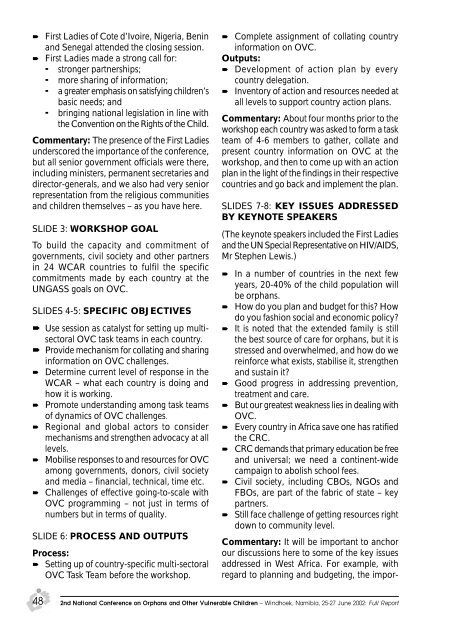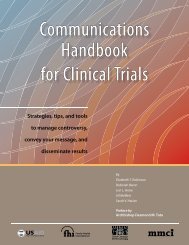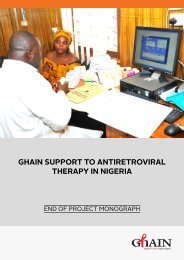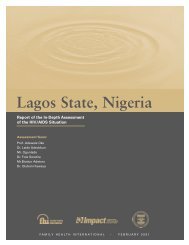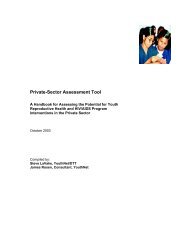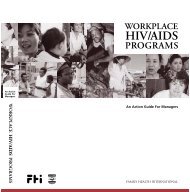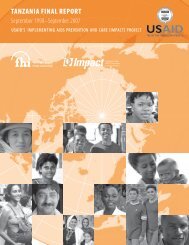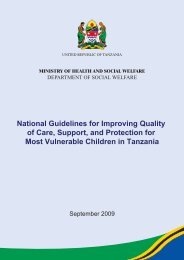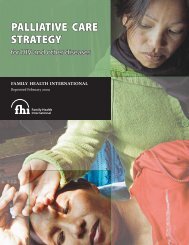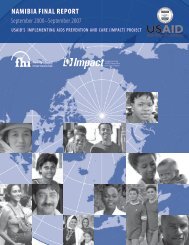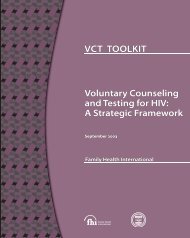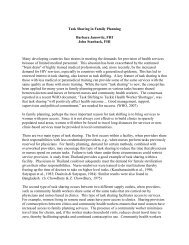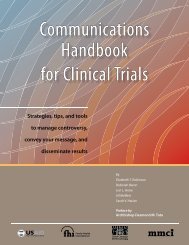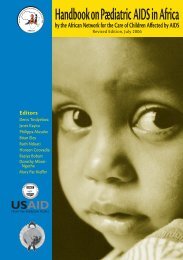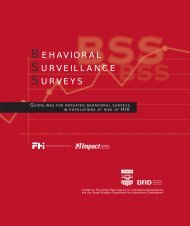2nd National Conference on Orphans and Other ... - FHI 360
2nd National Conference on Orphans and Other ... - FHI 360
2nd National Conference on Orphans and Other ... - FHI 360
You also want an ePaper? Increase the reach of your titles
YUMPU automatically turns print PDFs into web optimized ePapers that Google loves.
First Ladies of Cote d’Ivoire, Nigeria, Benin<br />
<strong>and</strong> Senegal attended the closing sessi<strong>on</strong>.<br />
First Ladies made a str<strong>on</strong>g call for:<br />
str<strong>on</strong>ger partnerships;<br />
more sharing of informati<strong>on</strong>;<br />
a greater emphasis <strong>on</strong> satisfying children’s<br />
basic needs; <strong>and</strong><br />
bringing nati<strong>on</strong>al legislati<strong>on</strong> in line with<br />
the C<strong>on</strong>venti<strong>on</strong> <strong>on</strong> the Rights of the Child.<br />
Commentary: The presence of the First Ladies<br />
underscored the importance of the c<strong>on</strong>ference,<br />
but all senior government officials were there,<br />
including ministers, permanent secretaries <strong>and</strong><br />
director-generals, <strong>and</strong> we also had very senior<br />
representati<strong>on</strong> from the religious communities<br />
<strong>and</strong> children themselves – as you have here.<br />
SLIDE 3: WORKSHOP GOAL<br />
To build the capacity <strong>and</strong> commitment of<br />
governments, civil society <strong>and</strong> other partners<br />
in 24 WCAR countries to fulfil the specific<br />
commitments made by each country at the<br />
UNGASS goals <strong>on</strong> OVC.<br />
SLIDES 4-5: SPECIFIC OBJECTIVES<br />
Use sessi<strong>on</strong> as catalyst for setting up multisectoral<br />
OVC task teams in each country.<br />
Provide mechanism for collating <strong>and</strong> sharing<br />
informati<strong>on</strong> <strong>on</strong> OVC challenges.<br />
Determine current level of resp<strong>on</strong>se in the<br />
WCAR – what each country is doing <strong>and</strong><br />
how it is working.<br />
Promote underst<strong>and</strong>ing am<strong>on</strong>g task teams<br />
of dynamics of OVC challenges.<br />
Regi<strong>on</strong>al <strong>and</strong> global actors to c<strong>on</strong>sider<br />
mechanisms <strong>and</strong> strengthen advocacy at all<br />
levels.<br />
Mobilise resp<strong>on</strong>ses to <strong>and</strong> resources for OVC<br />
am<strong>on</strong>g governments, d<strong>on</strong>ors, civil society<br />
<strong>and</strong> media – financial, technical, time etc.<br />
Challenges of effective going-to-scale with<br />
OVC programming – not just in terms of<br />
numbers but in terms of quality.<br />
SLIDE 6: PROCESS AND OUTPUTS<br />
Process:<br />
Setting up of country-specific multi-sectoral<br />
OVC Task Team before the workshop.<br />
Complete assignment of collating country<br />
informati<strong>on</strong> <strong>on</strong> OVC.<br />
Outputs:<br />
Development of acti<strong>on</strong> plan by every<br />
country delegati<strong>on</strong>.<br />
Inventory of acti<strong>on</strong> <strong>and</strong> resources needed at<br />
all levels to support country acti<strong>on</strong> plans.<br />
Commentary: About four m<strong>on</strong>ths prior to the<br />
workshop each country was asked to form a task<br />
team of 4-6 members to gather, collate <strong>and</strong><br />
present country informati<strong>on</strong> <strong>on</strong> OVC at the<br />
workshop, <strong>and</strong> then to come up with an acti<strong>on</strong><br />
plan in the light of the findings in their respective<br />
countries <strong>and</strong> go back <strong>and</strong> implement the plan.<br />
SLIDES 7-8: KEY ISSUES ADDRESSED<br />
BY KEYNOTE SPEAKERS<br />
(The keynote speakers included the First Ladies<br />
<strong>and</strong> the UN Special Representative <strong>on</strong> HIV/AIDS,<br />
Mr Stephen Lewis.)<br />
In a number of countries in the next few<br />
years, 20-40% of the child populati<strong>on</strong> will<br />
be orphans.<br />
How do you plan <strong>and</strong> budget for this? How<br />
do you fashi<strong>on</strong> social <strong>and</strong> ec<strong>on</strong>omic policy?<br />
It is noted that the extended family is still<br />
the best source of care for orphans, but it is<br />
stressed <strong>and</strong> overwhelmed, <strong>and</strong> how do we<br />
reinforce what exists, stabilise it, strengthen<br />
<strong>and</strong> sustain it?<br />
Good progress in addressing preventi<strong>on</strong>,<br />
treatment <strong>and</strong> care.<br />
But our greatest weakness lies in dealing with<br />
OVC.<br />
Every country in Africa save <strong>on</strong>e has ratified<br />
the CRC.<br />
CRC dem<strong>and</strong>s that primary educati<strong>on</strong> be free<br />
<strong>and</strong> universal; we need a c<strong>on</strong>tinent-wide<br />
campaign to abolish school fees.<br />
Civil society, including CBOs, NGOs <strong>and</strong><br />
FBOs, are part of the fabric of state – key<br />
partners.<br />
Still face challenge of getting resources right<br />
down to community level.<br />
Commentary: It will be important to anchor<br />
our discussi<strong>on</strong>s here to some of the key issues<br />
addressed in West Africa. For example, with<br />
regard to planning <strong>and</strong> budgeting, the impor-<br />
48 <str<strong>on</strong>g>2nd</str<strong>on</strong>g> <str<strong>on</strong>g>Nati<strong>on</strong>al</str<strong>on</strong>g> <str<strong>on</strong>g>C<strong>on</strong>ference</str<strong>on</strong>g> <strong>on</strong> <strong>Orphans</strong> <strong>and</strong> <strong>Other</strong> Vulnerable Children – Windhoek, Namibia, 25-27 June 2002: Full Report


